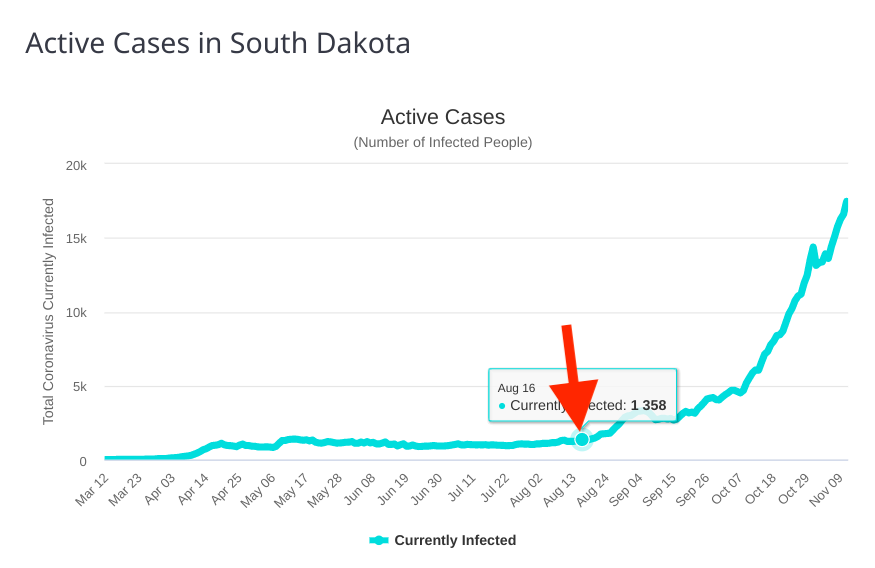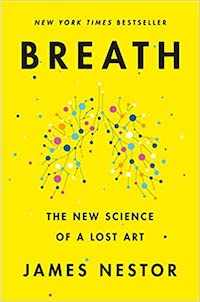I was really hoping my Trumpster friends were right about this. Alas. Two weeks after the election, 256,000 cases in U.S.
Category Archives: Health & Medicine
Denial
A South Dakota ER nurse says her Covid-19 patients often “don’t want to believe that Covid is real. Their last dying words are, ‘This can’t be happening. It’s not real.’ And when they should be… Facetiming their families, they’re filled with anger and hatred.”
Dying words: “This is not real!”
“Assumption of intelligent life”
“I’ll sometimes ask people why they’re not wearing a mask, a risky proposition in itself. Here in the Bible Belt, many say they’ve put everything in God’s hands. But the gift of free will was predicated upon an assumption of intelligent life.”
The pandemic doesn’t care about your personal freedom
“Our patience was the weapon”
“Citizen contact tracers”
(KMIZ TV) “The Cole County (MO) Health Department said in a Thursday morning news release it restructured how the department handles contact tracing. The new process instructs residents who have tested positive, to be their own contact tracers. […] Previously, health department staff reached out to people who may have been exposed to COVID-19. Now, that responsibility is in the hands of Cole County residents. […] The department said this was done in an effort to cut down on wait time and cut down on residents who may be unknowingly transmitting the virus.”
Sounds like the health department is overwhelmed. And “starting next week the department will no longer report active cases.” Uh oh.
So, we we won’t know how bad things really are? As for relying on friends and neighbors to let me know they might have exposed me to the virus… yeah, right.
Final day of Sturgis Motorcycle Rally

Breath
Breath: The New Science of A Lost Art (James Nestor)
 (Amazon) “There is nothing more essential to our health and well-being than breathing: take air in, let it out, repeat twenty-five thousand times a day. Yet, as a species, humans have lost the ability to breathe correctly, with grave consequences.”
(Amazon) “There is nothing more essential to our health and well-being than breathing: take air in, let it out, repeat twenty-five thousand times a day. Yet, as a species, humans have lost the ability to breathe correctly, with grave consequences.”
“Journalist James Nestor travels the world to figure out what went wrong and how to fix it. The answers aren’t found in pulmonology labs, as we might expect, but in the muddy digs of ancient burial sites, secret Soviet facilities, New Jersey choir schools, and the smoggy streets of São Paulo. Nestor tracks down men and women exploring the hidden science behind ancient breathing practices like Pranayama, Sudarshan Kriya, and Tummo and teams up with pulmonary tinkerers to scientifically test long-held beliefs about how we breathe.”
I found this book absolutely fascinating. Some of my favorite bits: Continue reading
Last Call
Slow breathing
From a study on “The physiological effects of slow breathing in the healthy human“:
“Slow breathing practices have been adopted in the modern world across the globe due to their claimed health benefits. This has piqued the interest of researchers and clinicians who have initiated investigations into the physiological (and psychological) effects of slow breathing techniques and attempted to uncover the underlying mechanisms.”
I spend a hour a day (sometimes 90 min) on the meditation cushion and it’s pretty much just follow the breath. I experience both psychological and physiological benefits. My BP can drop as many as 15 points after a 15 minute session.
“While changes in the cardiovascular system can induce changes in respiration, the influence that respiration has on the cardiovascular system is reportedly stronger. Studies in healthy humans have found that controlled slow breathing, particularly at 6 breaths per min, is associated with an increase in fluctuations of both blood pressure and heart rate, compared to breathing at a typical rate.”
I average about four breaths per minute during a typical session.
